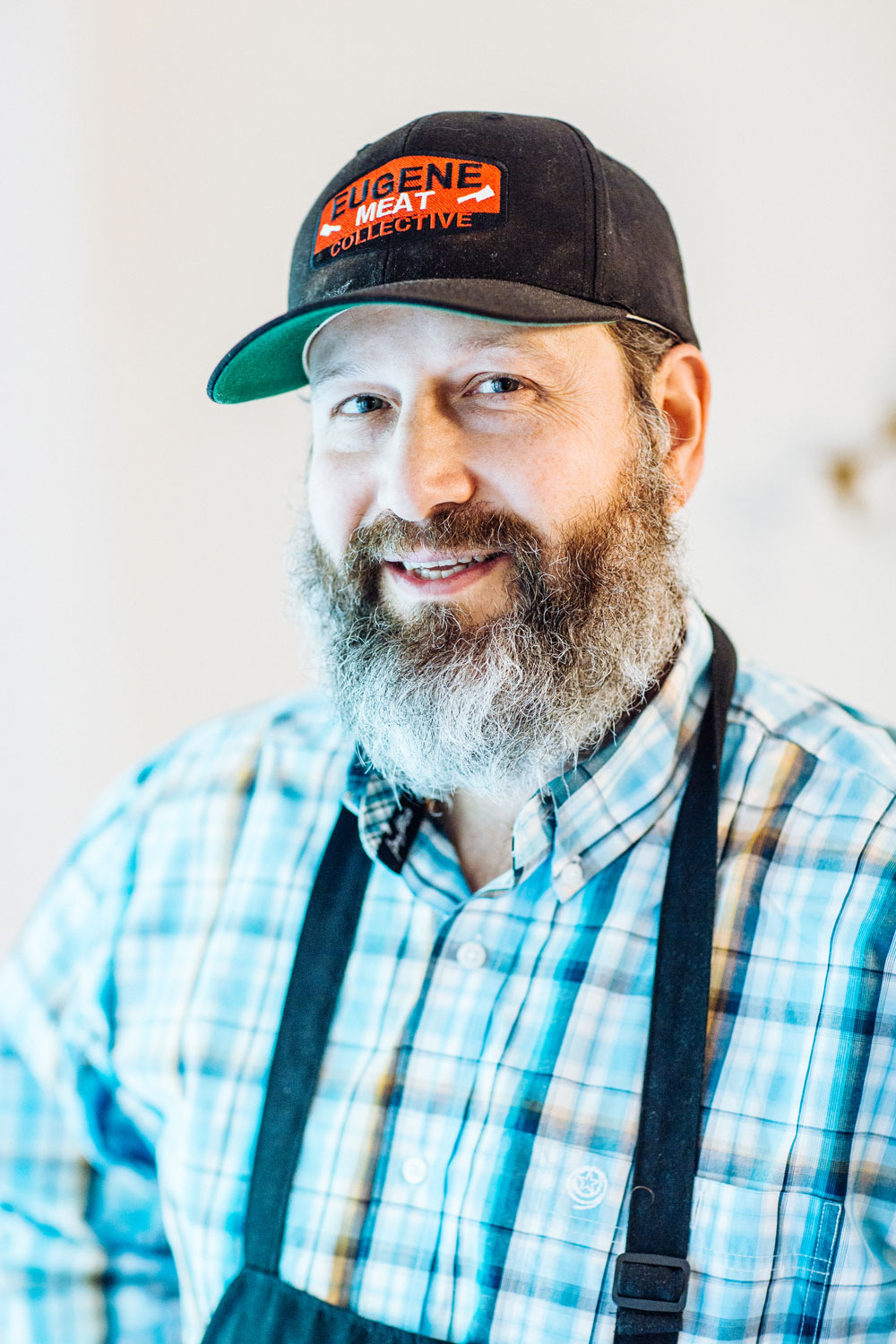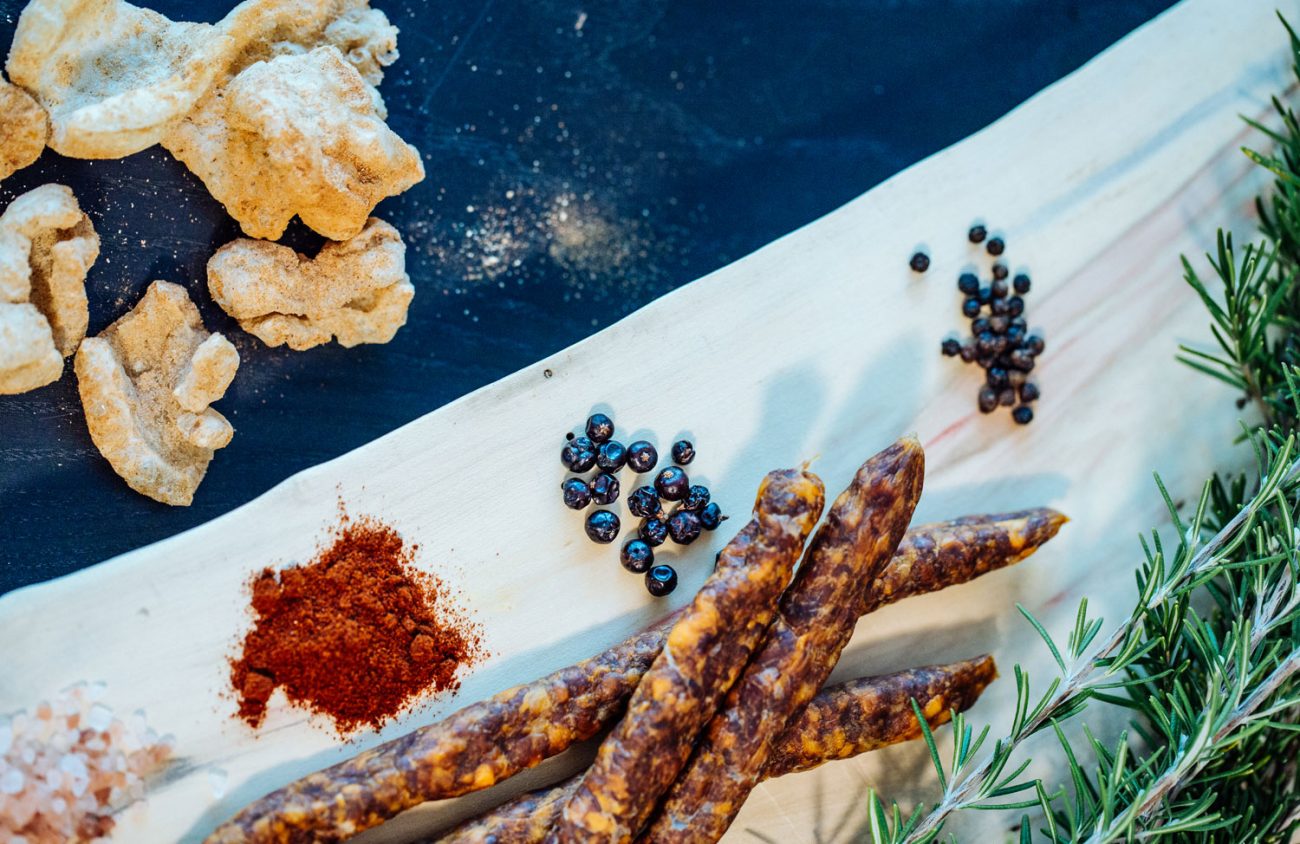That hamburger you’re biting into: An animal died for that. It was killed and bled out and cut up and ground down into a ropy mush by grand industrialized processes, only to appear on your plate as a circular chunk of flavorful protein, all prepared behind the glittery curtain of consumer convenience. Hey, presto!
This is not some morbid ideological statement meant to shame the meat-eating public but, rather, a simple and proper assertion of fact. And the fact that most of us are divorced from this fact — that the vast majority of us are not willing to slaughter, or even think about slaughtering the food we eat, and yet continue to eat it — is a bit of magical thinking that points to a serious rupture in our relationship to just about everything: food, nature, the cycle of life and death itself.
At Eugene Meat Collective (EMC), the idea is to stitch people back into a direct relationship with the meat they eat, and in so doing restore them to a mode of life that has held for the vast majority of human history, before it was disrupted in the past 200 years or so by mass industrialization and rampant consumerism — namely, our intimate involvement in feeding ourselves, instead of merely being fed. This is an extension of the farm-to-table movement, and so, quite literally, grassroots in nature.
In its mission statement, EMC lays out its “philosophy,” which doubles as a decent description of what, exactly, the collective offers: “…We believe that a shared, community-minded education in slaughter, butchery, meat cookery, and charcuterie can provide an effective and necessary path to rethinking our food system. Plus, it’s been our experience that food is far more pleasurable to eat when we are involved in the decisions that lead to its preparation.”
In other words, EMC is a private, hands-on butchery school where anyone interested in becoming more involved with the meat they eat can learn everything from slaughter and preparation to sausage-making and proper storage.
“The problem is disconnectedness from our food and the natural way of things,” says Eugene Meat Collective founder Jonathan Tepperman. He says he became part of this burgeoning national movement in a “roundabout” way, through a growing interest in wilderness survival and the urban homesteading he first encountered in Columbus, Ohio.
Influenced by journalist Michael Pollan, who advocates restoring food to its proper place in local homegrown culture, Tepperman became more and more passionate about sourcing his own food. “I had major issues with industrialized meat,” he says. “The adult thing to do is to kill an animal myself. There are no meat-eaters who have a leg to stand on when it comes to disparaging thoughts about hunters,” he adds, pointing out that it’s often hunters who make the fiercest conservationists.
Enlarge

Photos by Trask Bedortha
After relocating from Ohio to Eugene in 2015, Tepperman was introduced to Camas Davis, who in 2009 launched the first Meat Collective in Portland before going national with the Meat Collective Alliance in 2013. Davis urged Tepperman to head up a chapter in Eugene, and he’s been going full bore ever since. In partnering with local chefs, he’s offered classes on everything from lamb and pig butchering to clamming and pâté making to local restaurants, culinary kitchens and even campgrounds.
For Tepperman, the idea of reconnecting people with the ancient processes of butchering and meat preparation carries purposes far beyond the merely pragmatic. “We all feel like something is wrong,” he says, pointing out that our alienation from the source of our own sustenance has profound effects on how we feel about life — its purpose, its meaning.
“Fundamentally, eating is death,” he says. “In order for us to eat, other things die. We have been raised to be infantile around our food, and especially around meat.”
For Tepperman, that act of killing and preparing meat is a tradition as old as humanity itself, and it creates a sense of connectedness to nature and to each other — the very foundation of human culture.
For more information about Eugene Meat Collective, including a schedule of upcoming classes, visit eugenemeatcollective.com, visit the EMC Facebook page, call 408-489-0819 or send an email to eugenemeatcollective@gmail.com.
